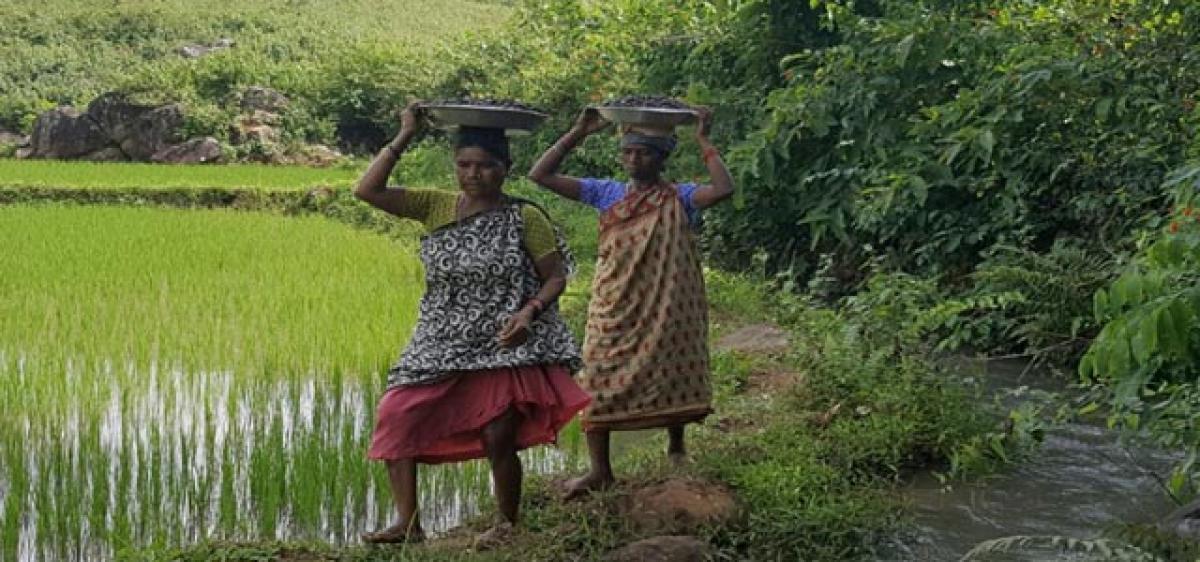Live
- Thomas Nomination Program in Gangadhara Nellore Constituency Draws Massive Support
- Venigandla Ram Receives Full Support in Gudivada, Keshineni Sivanath Vows Victory
- Sundeep Kishan teams up with Thrinadha Rao Nakkina for ‘SK30’
- Kajal set to thrill audiences in action-packed role as ‘Satyabhama’
- Karnataka Chief Minister Siddaramaiah Offers Condolences To Grieving Father Of Stabbing Victim
- BJP winning 35 seats in Bengal will guarantee freedom from illegal infiltration: Amit Shah
- Assault Incident In Karnataka Sparks Controversy Amidst Rising Tensions
- Only 6 minutes’ role in 222 days at Parliament
- CM Kejriwal, K Kavitha’s judicial custody extended in money laundering case till May 7
- Women BJD leaders Raseswari, Simarani quit party
Just In

Adivasis women are deprived of securing succession rights over the ensured forest titled land under the Forest Rights Recognition Act (FRA), 2006, due to inherent limitations in customary norms of tribe societies. The gender parity has been reduced to a cliché.
Adivasis women are deprived of securing succession rights over the ensured forest titled land under the Forest Rights Recognition Act (FRA), 2006, due to inherent limitations in customary norms of tribe societies. The gender parity has been reduced to a cliché. A new legal space has been created under the FRA, ensuring the registration of forest land titles jointly in the name of both the spouses in the case of married persons.
These forest land rights are heritable. However, no justiceable inheritance laws are in place for making a claim by a Adivasi woman on a par with man. The FRA is a legal tool to recognise forest land rights of Adivasis and other traditional forest dwellers over forest lands. However, the new legal space created through the FRA can only ensure the joint titles and woman title holder can enjoy the land during her life time.
The women successors of either of spouses are debarred from negotiating for justice and claiming equity in inherited property rights on a par with their counter men in the family. A glaring gap in the policy and legal framework in the country exists in the context of Scheduled Tribes. The British legal concept of individual private property destroyed the tradition of joint ownership and sharpened tensions within the Adivasi society also, while eroding their relationship with nature.
However, in the post-colonial period, some policy efforts were made to issue land titles in the name of women or jointly in the name of spouses over the government lands. However, the uncodified customary laws of Adivasis do not recgonise the inherited property right of a woman in the family and her rights are severely circumscribed and limited to usufruct only. The right to inherited property to an Adivasi woman is a cultural dependent. The legal norms are giving blind endorsement to the cultural norms.
The Supreme Court of India while dealing with a gender bias case in 1996 (Madhu Kishwar and others Vs State of Bihar) held that “it is not desirable to declare customs of tribal inhabitants as offending Articles 14,15 and 21 of the Constitution and each case must be examined when full facts are placed before the court.” The judgement reinforces gender inequity and female subordination in sharing the resources on equal base
The Hindu Succession Laws were enacted to undo past injustice and elevate a Hindu woman to equal status with dignity of person on a par with man in sharing their rights over inherited property.
However, the Hindu Succession Act, similar to Hindu Marriage Act and Hindu Adoption and Maintenance Act, excludes applicability of customs to the Scheduled Tribes as defined by Clause (25) of Article 366 of the Constitution unless the Central government, by notification in official gazette otherwise directs. Explanation 11 to Article 25 does not include them as Hindus. Thus neither the Hindu Succession Act, the Indian Succession Act, nor even the Shariat Law is applicable to the custom governed Adivasis. Thus Adivasi women are discriminated only on the ground of sex in the matter of intestate succession to the estate of the parent or husband.
Thus, there is no legal way Adivasi women could seek justice within the State or non-State traditional Adivasi forums to get equal right on a par with men if an Adivasi woman died intestate. Unfortunately, the British or post colonial legal policies have neither eliminated the gender bias in the property rights nor could recognise the community collective concept of resources without individualising the cultivations on the name of land survey. Although, the Hindu laws would not apply to Scheduled Tribes, the general principles of justice and equity should make them apply. Thus this issue must figure in the eye of current debate on conflicting personnel and constitution laws which are abrogating the equality and fairness.
By Dr Palla Trinadha Rao

© 2024 Hyderabad Media House Limited/The Hans India. All rights reserved. Powered by hocalwire.com







